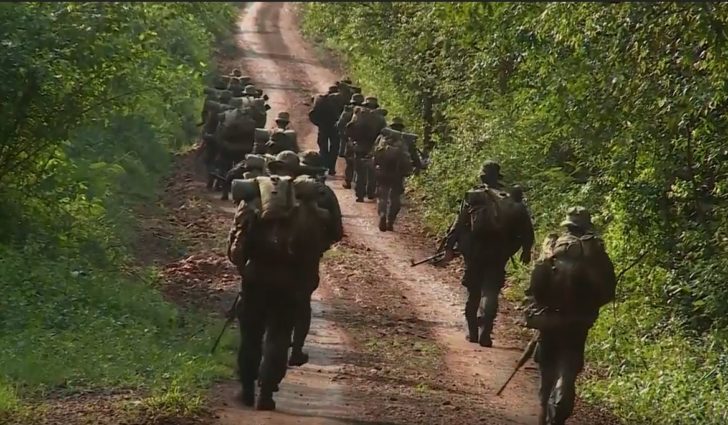Argentina’s president communicated the start of a “new defense policy” with a series of general and ambiguous announcements, but framed in a very clear message about moving toward the Armed Forces’ participation in the pursuit of crimes such as drug trafficking and terrorism. That is to say, the governing Cambiemos coalition’s will to incorporate the Armed Forces into missions related to domestic security matters – their participation in which is prohibited by law – was affirmed.
In line with the doctrine of “new threats” that the government has been promoting since January 2016, this reform proposes a series of coordinates to modify the missions that the political system gave the Armed Forces, through a cross-party agreement, after the return of democracy and over the following 30 years. This doctrine announced by the government adopts as its own the definition of an international agenda that has been imposed and is not necessarily associated with national interests.
In his speech, the president posed the need for Argentina to modernize in light of the challenges of the 21st century, adding that it is necessary to make current legislation regarding security and defense more flexible to achieve this. He also proposed that the military “collaborate on domestic security,” primarily to support the fight against drug trafficking at the country’s borders. Via decree 683/18 published today and a presidential order that has not been made public yet, the Armed Forces are given more duties. The reform, which modifies the regulatory decree of the Defense Law (727/06), is based on three main points: it eliminates any mention that an external aggression must be of state origin, which may expand the grounds for primary intervention by the Armed Forces to matters of security such as terrorism and drug trafficking, if they are characterized as “external aggressions.” At the same time, it places emphasis on tasks related to “logistical support” provided by the Armed Forces to the security forces. The concept of logistical support that it uses appears elastic enough to serve as a cover story for the operational intervention prohibited by the Security Law. Finally, it gives the Armed Forces the faculty of guarding strategic objectives without the limits set forth in the Defense Law. According to this law, the Armed Forces’ intervention in this area is prohibited unless a law passed by Congress defines those objectives as a military zone. All of which is to say that the reform entails a change in the political paradigm of intervention by the Armed Forces and, on some points, constitutes overreach with regard to the powers to regulate legislation by decree, since it goes against the Defense and Security Laws.
This change arouses great concern about how these “external aggressions” will be defined; who and with what criteria and scope will define military intervention in security matters, justified by the need to give logistical support to security forces; as well as about what is a strategic objective, primarily in relation to the ramifications that this could have with regard to managing social conflicts, an area in which the Armed Forces are prohibited from intervening and for which they are not prepared.
These measures are justified with arguments regarding modernization, but in reality they entail reproducing policies of proven ineffectiveness, which worsen problems instead of resolving them and which are being dismantled today in many countries. These policies have in no case contributed to resolving the problems identified with the so-called “new threats.” They failed in their objectives and had grave consequences for human rights: they escalated social conflict and levels of institutional violence, led to the murder and forcible disappearance of thousands of people and to increasing corruption of the military. In the case of Brazil, for example, the growing militarization of security has given the armed forces greater relevance in that country’s institutional life. The political ramifications of this cannot be underestimated in the region. The decision by Argentina’s president to announce these changes at a time when the Brazilian military is trying to impact on civic life on all fronts, is greatly alarming.
The path chosen by the government circumvents social and political debate about an issue that is fundamental to Argentina’s democracy. It also bypasses any debate regarding the congressional oversight that must exist if one takes seriously that this is a “true reform of the national defense system.” It is a unilateral and improvised decision that, far from providing more certainty to the people, creates a climate of uncertainty and implies a democratic setback. Neither the Armed Forces nor civil society feel more secure or protected by democracy with this type of unilateral and single-party decision.
This reform opens a very dangerous door to overturning the principle of separation between national defense and domestic security; it de-professionalizes the Armed Forces and turns them into actors in the “fight against crime,” and it enables a militarization of domestic security that will have profound consequences for the democratic system. This is not modernizing but, rather, backsliding.
Carlos Acuña, Luciano Anzelini, Ileana Arduino, Jorge Battaglino, Alberto Binder, Paula Canelo, Agustín Colombo Sierra, Nicolás Comini, Gastón Chillier, Enrique del Percio, Rut Diamint, Lucila Edelman, Natalia Federman, Enrique Font, Sabina Frederic, Jaime Garreta, Manuel Garrido, Juan Carlos Herrera, Gabriel Kessler, Diana Kordon, Paula Litvachky, Ernesto López, Juan López Chorne, Pablo Martínez, Germán Montenegro, Alejandra Otamendi, Gustavo F. Palmieri, José Paradiso, Hernán Patiño Mayer, Sidonie Porterie, Marcelo Sain, Raúl Sánchez Antelo, Catalina Smulovitz, Fernando Pino Solanas, Luis Tibiletti, Juan Tokatlian, Manuel Tufró, José M. Vásquez Ocampo, Horacio Verbitsky.
Grupo Convergencia XXI
Instituto Latinoamericano de Seguridad y Democracia- ILSED
Centro de Estudios Legales y Sociales- CELS
Grupo Fragata
Espacio Autónomo de Pensamiento Crítico

